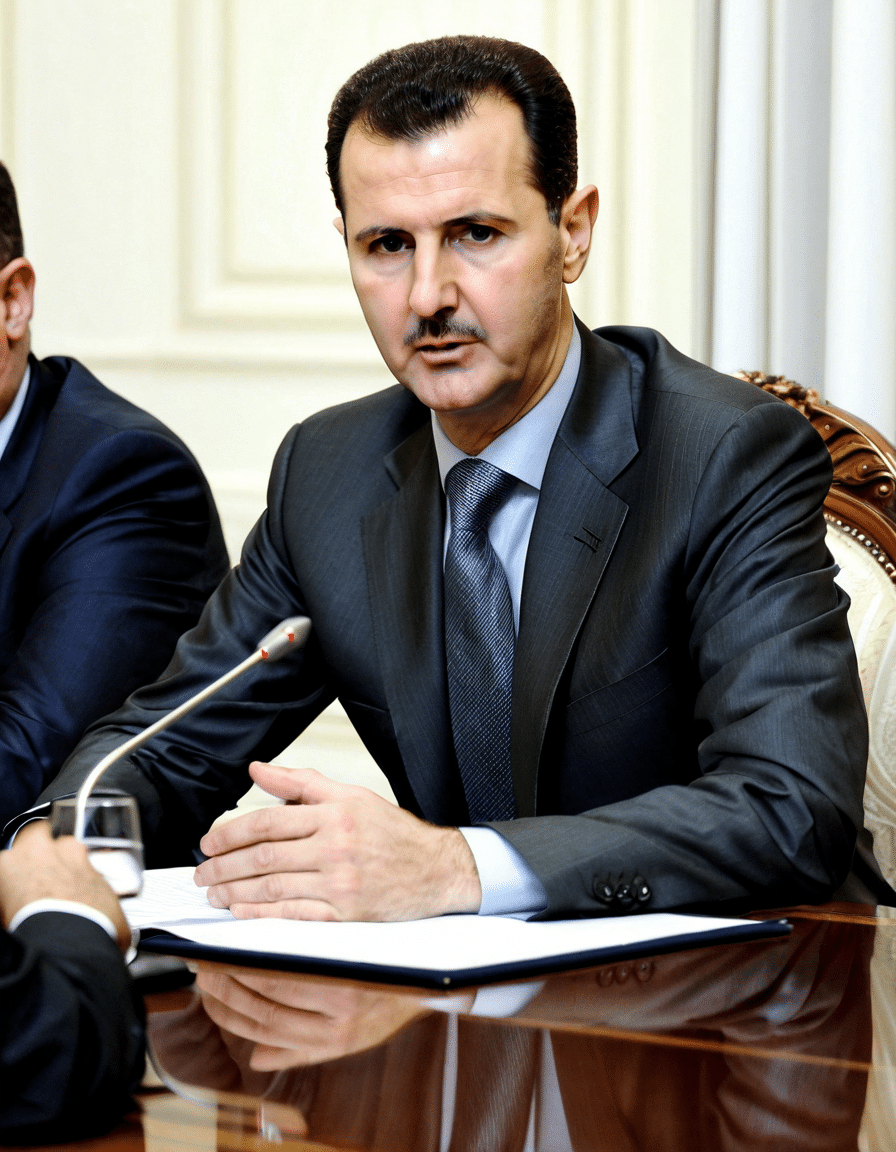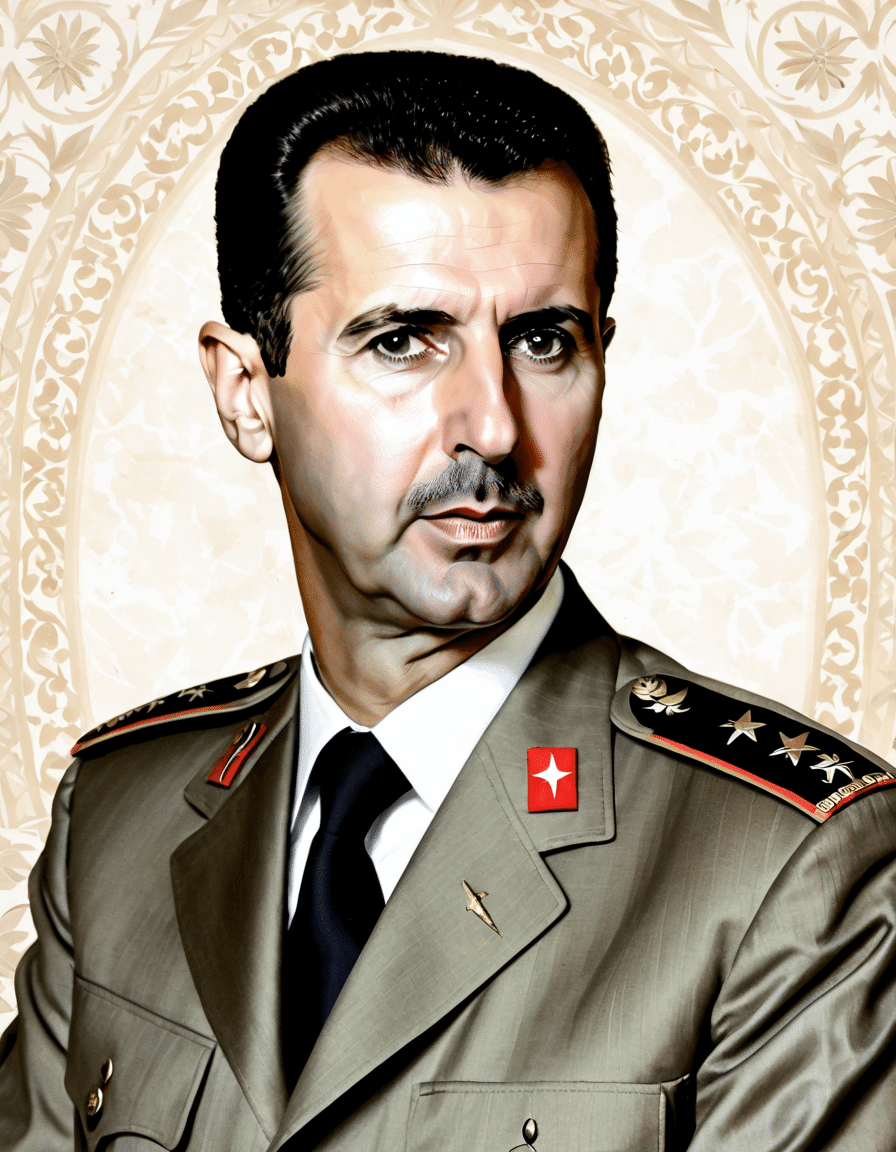Bashar al Assad, the current President of Syria, is a figure that stirs strong opinions and evokes fierce debates. Since assuming office in 2000, he’s transitioned from a hopeful leader viewed as a potential reformist to a contentious figure deeply entrenched in conflict and criticism. His early career as an ophthalmologist conveyed an image of modernization, but the violent eruption of civil unrest during the Arab Spring in 2011 triggered a significant shift. This evolution reveals the facets of his leadership style that changed from an optimistic approach to one of oppressive autocracy. The intricate legacy of his family’s political background significantly colored his governance, influencing both his decisions and public perception.
In those early years, Bashar al Assad’s ascension was marked by a wave of hope. He was perceived as a breath of fresh air, promising reforms and pragmatism. Yet, the political climate in Syria, rooted in a long history of authoritarian rule, posed a considerable challenge. The optimism soon faded as protests began flooding the streets, inspired by uprisings across the Arab world. Protests demanding democratic reforms were met with violent crackdowns, revealing an inclination toward hardline measures and a reluctant embrace of oppression. Bashar al Assad’s evolution from a leader aiming for modernization to one entrenched in conflict offers profound insights into the challenges faced by both leaders and their nations during times of change.
Bashar al Assad and the Impact of the Syrian Civil War
The Syrian Civil War has unarguably defined Bashar al Assad’s presidency, acting as both a crucible and a measuring stick for his leadership. Since the beginning of the conflict in 2011, the Syrian population has endured unimaginable suffering, leading to a major humanitarian crisis. Millions have been displaced, either within Syria or as refugees in neighboring countries. The international community has frequently decried the humanitarian implications of the war, yet responses from global powers have been inconsistent and often politically motivated.
One of the most haunting echoes of this civil strife is the use of chemical weapons by Assad’s regime. Incidents like the 2013 Ghouta attack brought global attention and condemnation but ultimately led to limited intervention from Western powers. The stark human cost of the war has led to severe repercussions for both Syria and global geopolitics, with extremist groups like ISIS finding fertile ground amid the chaos. The media often portray Assad through a prism that evokes comparisons to figures like Yasser Arafat, where leadership, resistance, and survival exist in a complicated interplay.
Internationally, the reaction to the violence has raised questions about political loyalties and moral responsibilities. Just as the Abu Ghraib prison scandal prompted outrage regarding human rights in Iraq, reports of detention center abuses in Syria have drawn attention yet often failed to mobilize robust international action. This raises significant inquiries about how the world prioritizes human rights in the Middle East, with responses sometimes appearing starkly muted compared to the outcry over incidents in Iraq.

Bashar al Assad’s Controversial Alliances and Relationships
A complete assessment of Bashar al Assad’s leadership largely revolves around his strategic alliances. His regime’s relationship with Iran and Russia has played a crucial role during the civil war, providing vital military and diplomatic support. These partnerships have not just cemented Assad’s power but have also altered the balance of influence in the region. With Iranian forces backing his military operations, and Russian airstrikes significantly bolstering his position, Assad’s reliance on these relationships highlights the complexities of Middle Eastern geopolitics.
Contrastingly, the West has adopted a far different approach to the Assad regime compared to historical relationships with leaders like Yasser Arafat. While Arafat continuously sought international support for Palestinian statehood, Bashar al Assad’s entrenchment in a military-styled governance has led to strained relations with many Western nations. The dichotomy in global perceptions illustrates how such leadership can invoke varied international responses, often contingent upon strategic interests rather than humanitarian considerations.
The complexities surrounding these alliances invite scrutiny. While Assad may hold power due to external support, the ramifications of his ties could create lingering instability in the region. It’s a precarious balancing act that paints a dim picture of the future. As his regime continues alongside a backdrop of global political maneuvering, the implications of these alliances stretch well beyond Syria’s borders.
The Abu Ghraib Effect: Human Rights Violations under Assad
The Abu Ghraib scandal in Iraq became emblematic of a broader conversation about human rights violations across the Middle East. Drawing parallels between the abuse scandals in Iraq and reported atrocities in Syrian detention centers reveals vivid images of a troubling reality. Accounts from survivors of Assad’s regime showcase systematic torture and human rights abuses that haunt the conscience of the international community.
Human rights organizations have repeatedly documented these violations, highlighting how they reflect a broader culture of oppression in the Assad regime. The methods employed in enforcement reflect a disregard for human dignity, echoing the shock and horror surrounding Abu Ghraib. The global community’s response, however, has often felt tepid, leading many to question the sincerity of international outrage concerning human rights abuses.
This muted response underscores a complicated dynamic. While human rights violations warrant outcry, discerning a path forward often proves challenging. The reluctance to hold Assad accountable raises critical questions about global responsibility and the effectiveness of international human rights efforts. The comparison with the outrage following the Abu Ghraib incident serves to illustrate the inconsistency in applying human rights principles in practice.

Bashar al Assad and Media Representation: A Complex Portrait
The portrayal of Bashar al Assad in media fluctuates not merely with the political climate, but also with the stories told by different outlets. Western media tends to frame Assad as somewhat of a villain, emphasizing his commitment to violence against his own people. Alternately, other narratives emerge from regional sources that perceive him as a stabilizing force in a context filled with chaos. This leaves audiences with a multifaceted view, creating complexities in public perception.
Satirical commentary from personalities like Ramy Youssef sheds light on these narratives, critiquing authoritarianism while also highlighting the absurdities surrounding political figures. The layers of media representation underline the struggles that accompany leadership in fractured societies. As diverse viewpoints compete for dominance, audiences navigate through a spectrum of emotions and opinions, frequently influenced by historical narratives and current events.
In analyzing media representations, the role of technology cannot go unnoticed. Platforms like social media have accelerated the dissemination of information and misinformation alike. As Bashar al Assad’s image shifts and morphs, it’s crucial for audiences to filter through the noise and engage critically with the information presented. The changing narrative landscape not only impacts Assad but also shapes perceptions of governance and resistance throughout the region.
The Future of Bashar al Assad’s Regime: A Polarizing Legacy
As of 2024, Bashar al Assad’s tenure remains contentious. After surviving a decade of intense civil war and international isolation, he retains an iron grip on power. Yet, the state of Syria is far from stable. The country’s economy grapples with severe hardships, largely attributed to a complex combination of internal mismanagement and external sanctions. The scars of war run deep; many citizens remain wary, questioning the viability of governance under Assad.
The younger generation, in particular, harbors contrasting views compared to the older populace that witnessed the early years of Assad’s rule. Their expectations include demands for reform, transparency, and improvements in quality of life. These emerging sentiments signal a potential shift in the political landscape, where the longing for change nests deep within the heart of a fractured society.
Potential scenarios about Assad’s longevity swirl, contingent upon internal dissent and external pressure. Observers speculate whether his regime can withstand the weight of growing societal unrest and economic struggles. History tells us that oppressive regimes often crumble under the weight of their own contradictions; thus, Syria’s path forward remains shrouded in ambiguity.
The Lasting Impact of Bashar al Assad
The legacy of Bashar al Assad is intertwined with a complex web of international relations, humanitarian crises, and a profound re-evaluation of approaches to governance. His leadership challenges conventional norms and confronts the boundaries of human rights. As the ongoing saga of Syria unfolds, the international community finds itself at a crossroads, grappling with the lessons learned from Assad’s regime.
The implications of Assad’s reign extend beyond Syrian borders, resonating within the global discourse on conflict and resolution in the Middle East. As stakeholders reflect on the past and present, it becomes clear that the story of Bashar al Assad is not solely a tale of Syria but also a chapter in the intricate narrative of governance, power, and the quest for freedom. In reckoning with this legacy, a palpable urge for change surfaces—an awakening that echoes not just in Syria but across the region.
In the end, the future lies not only in the hands of Bashar al Assad but more importantly, in the hands of the Syrian people who yearn for peace, dignity, and a path toward a better tomorrow.
Bashar Al Assad: The Controversial Leader of Syria
A Glimpse into His Background
Bashar al Assad wasn’t always the notorious figure he’s seen as today. Born in 1965, he was initially expected to follow his older brother, Bassel, into the family business of politics, but fate had other plans. Following Bassel’s untimely death in 1994, Bashar took the reins, stepping into a leadership role at just 34 years old. An interesting tidbit: before embracing his leadership position, he was a medical doctor specializing in ophthalmology. This brief stint in medicine highlights a different era in al Assad’s life, one far removed from the political turmoil that would soon engulf Syria. His rise was also fueled by a significant push from his father, Hafez al Assad, whose decades-long rule set the stage for the current regime.
His Leadership Style and Public Perception
Bashar al Assad’s leadership style has sparked heated debates globally. He’s often described as calm and collected, a demeanor that sharply contrasts with the widespread chaos in the country. Interestingly, surveys show that the young generation in Syria still harbors some nostalgic feelings towards him, viewing him as a stabilizing force in contrast to others in the region. Some credit his administration for technological advancements; for instance, during his rule, Syria saw an increase in cell phone usage—though controversies and hardships often overshadow such achievements. Who would have thought that during the same period, an unfortunate cell phone outage today would stun citizens, showing just how interconnected and fragile modern communication can be?
A Pivotal Recent Era
Bashar al Assad’s regime has faced immense scrutiny, particularly during the Syrian Civil War which began in 2011. Now, here’s a quirky fact: amidst this turmoil, al Assad has managed to maintain a stronghold on power, even with international sanctions and military interventions. More astonishing is the resilience of his regime—it’s often compared to a Schlage smart lock, tough to break through despite numerous attempts. Critics argue that this persistence is more about tyrannical clutches than popularity, raising questions about what the future holds for Syria. And while some might casually flick through scandals—like celebrity stories about Zoe Kravitz—real-life stories like al Assad’s remind us of the gravity behind international leadership.
Controversies and Global Reactions
As Bashar al Assad’s era continues, he finds himself at the center of global debates, balancing complex international relations while attempting to forge a path of stability. His leadership has prompted various discussions, especially when it comes to human rights violations and diplomatic engagements. Amidst all of this, he has become a figure that’s as fascinating as it is controversial. Speaking of captivating arcs, one can draw parallels to various life transformations, like Nikocado avocado weight loss, each reflecting unique stories of struggle and resilience. Ultimately, as Syria stands at a critical juncture, many are left wondering what direction Bashar al Assad will take next.
Through transitions fraught with dramatic developments, the story of Bashar al Assad reminds us of the burdens accompanying leadership, especially in turbulent times—much like navigating through a store in Wayne, NJ, each twist holds hidden lessons.




